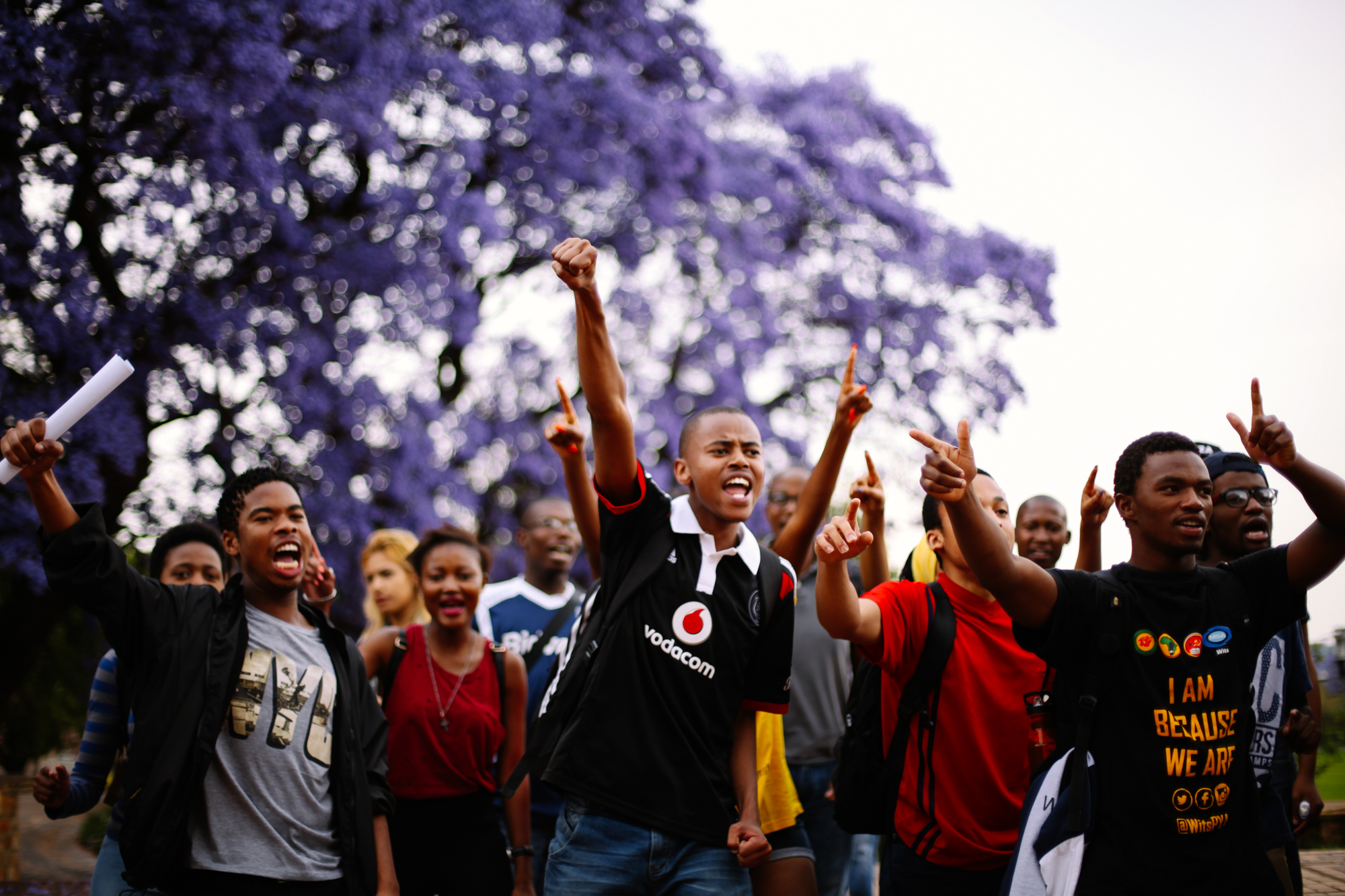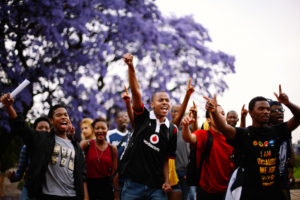Barney Pityana: Let’s resolve the impasse

JOHANNESBURG, SOUTH AFRICA – OCTOBER 15: Wits students embark on a protest over an increase on the tuition fees on October 15, 2015 in Johannesburg, South Africa. The students shut down the campus yesterday and declared its grounds a “no in, no out” zone. Classes and other academic activities were also suspended. (Photo by Gallo Images / Nicholas Rawhani)
Over the past two years, student protests at campuses countrywide have placed the spotlight on higher education in unforeseen ways. Those of us who were student leaders in campus protests a few generations back, as well as those of us who were active in the liberation movement, have been astounded by the resilience of the current protest movement.
The irony is that, as the revolutionaries of our time on campuses or in combat for the liberation of our country, fortune has thrust upon us the responsibility to superintend the fortunes of today’s young minds and steer the nation into a deeper sense of itself and its wellbeing.
To this end, the recent state of the nation address marked yet another lost opportunity – one of many that have become characteristic of President Jacob Zuma’s leadership. In his lacklustre speech, Zuma failed to lift the nation’s hopes about higher education.
However, it must be said that the importance of setting out what government has done to address students’ concerns must be acknowledged – and Zuma did this. In this regard, much has been done.
But what our president failed to do was give the nation a vision and a new, higher vision for the intrinsic value of higher education.
Time for change
The meaning of higher education is more than the numbers and the material benefits that university studies are supposed to assure. From the time former president Nelson Mandela took office, the nation has presented the case for education and its value with regard to jobs and social security.
Expectations are there, and they are high. The truth, however, is that we have failed to deliver on such promises.
Too many young people drop out of school, while many who are privileged to attend universities fail to complete their studies in the allotted time for a variety of reasons.
Even more alarming, a disproportionate number fail to find jobs once they graduate. Is it not time we changed the message about education – in particular, higher education?
Maybe we should start by asserting that education is essential for the achievement of our true humanity. At its core, education is about human development, understanding the world and oneself in it, and cultivating the skills and intelligence necessary to empower people to become fully human.
The worlds of science and technology, of culture and history, of society and its people, are best unlocked by stretching human intelligence and curiosity. This, in turn, leads to the joy and satisfaction of accomplishment.
Education is life. Education feeds the human desire to know, and then to know more.
Education occupies pride of place in our national budget. This has been the case since 1994. And yet inequalities prevail, as do inadequate facilities and provision. As a result, resentment, anger and lack of fulfilment have become part of the national psyche. It goes some way towards explaining why protesters destroy educational facilities and why children are kept out of school whenever we have beef about service delivery.
From libraries to laboratories to school transport, all go up in smoke if our demands are not met. This suggests that South Africa is not emotionally attached to the educational institutions the state has provided.
WEB Du Bois, the African-American educationist and philosopher, wrote in his 1903 book, The Souls of Black Folk, that higher education should cultivate a profound sense of values, of refinement of character, of service to others and of the cultivation of the mind. Through education we learn empathy – and outrage when things go wrong.
Yet we also value attributes such as joy, love, aesthetics, critical judgement and the sublime.
Higher education should transform character and shape moral leaders and intellectuals. As Du Bois says, the function of a university is “to be the organ of that fine adjustment between real life and the growing knowledge of life, an adjustment which forms the secret of civilisation”.
When we do that, we will be able to distinguish things of value from mere trivia. We will employ strategies to accomplish our objectives and understand the difference between what is essential for survival and what is necessary for human happiness and the joy of accomplishment.
Our education system, in particular, should seek to achieve that which is stated in the preamble to the Constitution: (to) “improve the quality of life of all citizens and free the potential of each person”.
The prevailing impasse in higher education may not be resolved by commissions of inquiry, by throwing more money into the pockets of students or into the coffers of institutions, by the use of excessive force at university campuses, by the imprisonment of student activists, or by isolating student leaders.
We do not address the matters under contention simply by decrying the political and intellectual lack of maturity or sophistication displayed by many student activists. Neither do we achieve much by comparing this generation of students to ours 40 years ago and before. We would do well to create at our campuses forums for debate and dialogue, even as we need to recognise that education has a subversive element. It seeks change and seeks to improve life. Education has a transformative character.
“We cannot continue as we are”
To effect change, we need to rethink many of our principles and practices in higher education. One hopes that there could be a national consensus about the idea of a university. To this end, we need to look beyond momentary slogans, political rhetoric and material benefits. Perhaps we should recognise what kind of society we can become and acknowledge the role that higher education can play in its accomplishment.
Our country needs to recover its idealism as well as the conviction that it is possible to achieve that which is best.
We ought to know that we cannot continue as we are. Violence and shouting do not solve problems; use of force and power are pointless unless used smartly.
The antics in Parliament show us that the culture of irrational behaviour is not confined to campus politics. The palpable lack of moral consciousness in public life supports the idea that one does not have to work for what one gets – intrigue, lies and the failure to recognise that it is not just the letter of the Constitution that we must satisfy, but also its spirit, appear to dominate. This spirit is not accessed by rules and force, but by cultivating confidence, trust and pride among those who govern and those who are governed.
Somehow leadership must understand the value of “honest and earnest criticism”, as Du Bois puts it. Criticism by those whose interests are affected is, in his view, “the soul of democracy and the safeguard of modern society”.
In 1995, the Commission on Higher Education steered us on a new course. The commission’s report has served the policy landscape for higher education for 21 years. It is time to revisit those principles so we can recognise where that report fell short or is failing to take us beyond the anti-apartheid mind-set.
What the students seem to have done is compel the nation to interrogate the bourgeois and even neoliberal assumptions that form the bedrock of our education system.
It must be acknowledged that however much South Africa provides free or progressively freer education, there will remain unease about the education system itself. In other words, the clamour could well be free education in an intellectual ghetto.
That dilemma is not resolved by the slogan “free, decolonised and quality education”. Education is a process. We need to agree on the first steps necessary to accomplish our goals.
Former president Thabo Mbeki will be installed as the chancellor of the University of South Africa tomorrow. One hopes that he will take the opportunity to rally the nation and the higher education sector into developing a renewed vision for higher education, and call us all to a new appreciation of its potential to do good.
This column first appeared in City Press.




